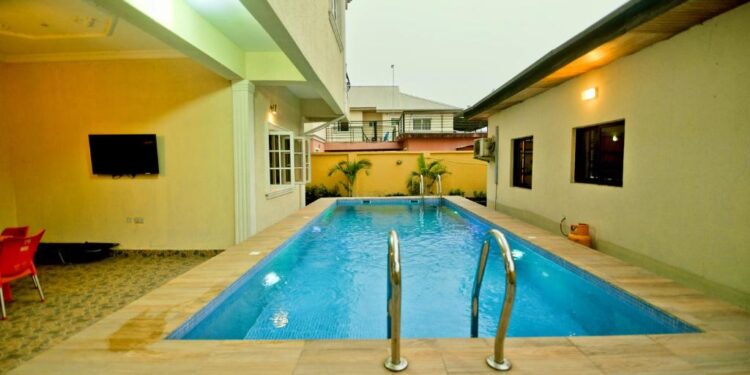Block of flats have emerged as the most commonly used property type for short-term rentals in Lagos, while swimming pools top the list of preferred amenities among guests, according to a new academic study.
The research, titled “Evaluation of the Short-Term Rental Housing Market in Nigeria,” was conducted by Joseph Oyewale Oyedeji of Bells University of Technology, alongside scholars from Hong Kong Polytechnic University and Chicago State University.
It offers one of the first comprehensive analyses of the city’s fast-growing short-term rental market.
According to the study, block of flats topped the list of property types used for short-term rentals, with a relative importance index (RII) of 0.905, showing that investors and managers overwhelmingly prefer this format.
These flats also had the highest occupancy rate (RII: 0.914), confirming their popularity among guests, likely due to affordability and ease of use.
While different housing types — including semi-detached houses, terraces, and bungalows — are used for short-stay accommodations, none matched the performance or preference level of block of flats. Bungalows, for instance, were the least used, with lower rental demand and occupancy rates.
On the amenities side, the report revealed that swimming pools are the most attractive facility to renters, followed by indoor games and outdoor relaxation spaces like courtyards. Guests were reportedly willing to pay a premium for these features, indicating that lifestyle-driven preferences play a key role in the market.
“Block of flats is the most used type of residential property for short-term rentals in the study area. Also, block of flats has the highest occupancy rate among properties used for short-term rental housing in the study area,” the report read in part.
It added, “Swimming pool is the facility that the users prefer most in short-term rental housing.”
The study drew insights from 42 professional estate surveyors and valuers actively managing short-term rental properties across the Lagos Mainland and Island. Their responses provided valuable data that allowed the researchers to examine trends in rental values, occupancy rates, investor motivations, and the overall structure of the market.
More insights
Between 2018 and 2023, short-term rental prices in Lagos rose steadily across all property types. Detached and semi-detached houses saw the sharpest increases, while block of flats—despite being the most affordable—recorded consistent growth due to high occupancy and availability.
- The study found that converting regular homes into short-term rentals is the most common investment strategy, outpacing the development of purpose-built units. While this has supported market growth, the authors warn it may reduce long-term housing stock, pushing up rents and limiting access to affordable homes.
- Interestingly, none of the surveyed properties were listed on major platforms like Airbnb, and the sector remains unregulated. While this reflects the market’s early stage, the researchers argue that formal regulation will become necessary to prevent housing shortages and price hikes.
As short-term rentals continue gaining traction—especially among middle-income and leisure travelers—the study calls for a balanced approach that supports growth without undermining housing accessibility.
What you should know
According to BuyLetLive’s 2024 Nigeria Property Price Index Report, short-let apartment prices in Lagos jumped by over 200% in 2024, marking the sharpest rise in the city’s residential real estate market. This followed a 12.95% increase in 2023 and a 46.4% surge earlier in 2024, driven by inflation and rising construction costs that forced developers to raise prices.
- Ikoyi led the price hikes with a 60% increase, followed by Magodo, Lekki Phase 1, and Ikeja. Other areas like Surulere, Yaba, Ajah, and Gbagada also saw significant but slightly lower growth.
- Starting a short-let business in Lagos requires capital and compliance. Many hosts begin with family or inherited properties and spend millions, up to N15 million, to furnish units to executive standards.
Registering with local authorities and, in some cases, obtaining a SCUML certificate from the EFCC are common steps to operate legally and open corporate accounts.
- Location and lifestyle features matter. Properties in Ikeja, Magodo, Yaba, Lekki, Ikoyi, and Victoria Island are in high demand. Guests are drawn to high-quality interior design, streaming services, and amenities like swimming pools.
Daily rental rates vary by size and area:
- 1-bedroom: N50,000–N100,000
- 2-bedroom: N70,000–N120,000
- 3-bedroom: N90,000–N180,000
- 4-bedroom: N250,000–N450,000
Hosts often offer discounts for extended stays and charge a refundable caution fee—typically around N100,000—to cover potential damages.
Visibility is key in attracting guests. Hosts use agents, digital listing platforms like Airbnb, Booking.com, PropertyPro, and Nigeria Property Centre, as well as paid social media promotions through influencers—especially on Instagram. While some platforms charge a subscription, others take commissions per booking. Positive guest referrals and reviews are also vital for repeat business.
Guests favour short-lets for privacy, space, and convenience. From family events and romantic getaways to discreet stays, many prefer the home-like feel of short lets over hotels. Access to a kitchen, more room for group stays, and flexibility are key reasons for this growing demand.













